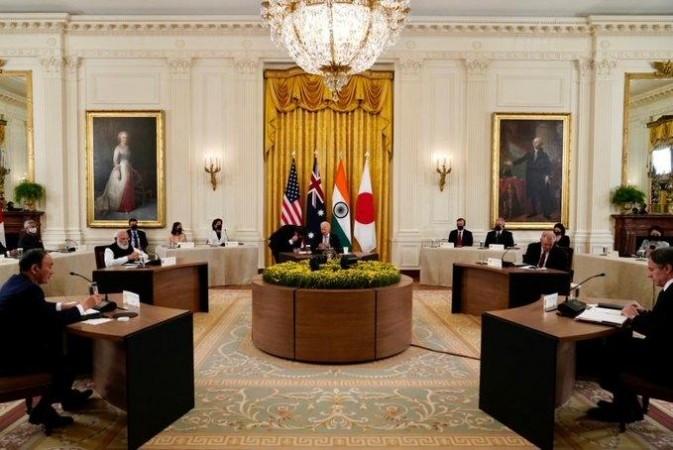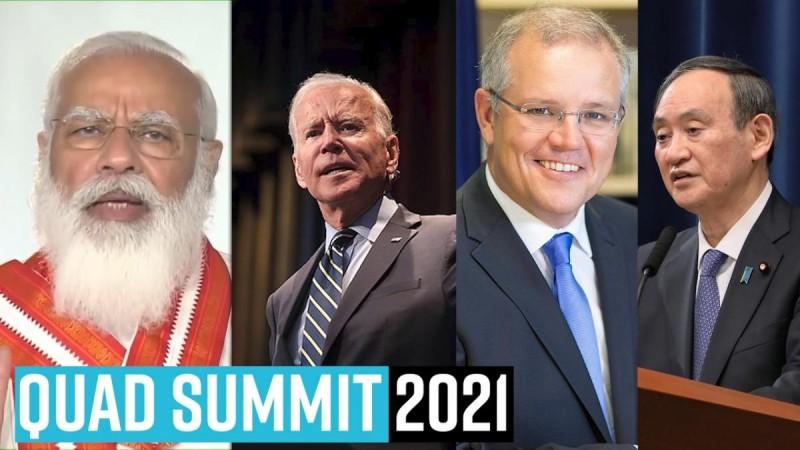The leaders of the Quad nations -- the US, Australia, Japan and India -- have denounced the use of terrorist proxies and demanded an end to support for terrorism, while introducing new areas of cooperation, especially in technology.
A joint statement adopted by Primes Ministers Narendra Modi of India, Scott Morrison of Australia and Yoshihide Suga of Japan and US President Joe Biden after their summit on Friday, said:
"We denounce the use of terrorist proxies and emphasise the importance of denying any logistical, financial or military support to terrorist groups which could be used to launch or plan terror attacks, including cross-border attacks."

That segment of the statement applies to Pakistan, even though it was not named, and another, without mentioning China directed attention to its aggressive actions in the region, from the Himalayas to the Pacific Ocean.
"Together, we recommit to promoting the free, open, rules-based order, rooted in international law and undaunted by coercion, to bolster security and prosperity in the Indo-Pacific and beyond. We stand for the rule of law, freedom of navigation and overflight, peaceful resolution of disputes, democratic values, and territorial integrity of states," the leaders said.
Their joint statement did not, however, put forward any specific joint defence or security measures. Instead, it stated: "We also recognise that our shared futures will be written in the Indo-Pacific, and we will redouble our efforts to ensure that the Quad is a force for regional peace, stability, security, and prosperity."
To bring a measure of permanence to what has been an informal group, the four agreed to hold annual summits and meetings of Foreign Ministers in addition to regular sessions of senior officials.
The leaders said that they would coordinate diplomatic, economic, and human-rights policies towards Afghanistan and deepen counter-terrorism and humanitarian cooperation.
Most of the defined actions proposed by the Quad leaders are about cooperation and helping themselves and others in the region.
Cooperation to end pandemic
Taking on the current challenge of the pandemic foremost, the declaration said: "Our partnership on Covid-19 response and relief marks an historic new focus for the Quad."
They welcomed New Delhi's resumption of vaccine exports and the Indian company Biological E producing at least one billion safe and effective Covid jabs by the end of 2022, financed in part through Quad investments.
India's Foreign Secretary Harsh Vardhan Shringla said that the vaccine would be the Johnson & Johnson type, which requires only one shot.

Japan will provide finance for the distribution of the vaccines and Australia will buy jabs for distribution in the Southeast Asia region and also pay for their delivery, according to the declaration.
The leaders said that they "will also strengthen our Science and Technology cooperation" in clinical trials and genomic surveillance to bring a quick end to the pandemic and also "conduct a joint pandemic-preparedness tabletop or exercise" next year.
They committed themselves to fight climate change by working towards zero net emissions by 2050 and increase their commitments to cut greenhouse gas emissions.
The leaders also agreed to pursue the deployment of clean-hydrogen technology, which is one of Modi's initiatives.
Several of the new initiatives are in technology, which had risks posed by China in the background.
"We are mapping the supply chain of critical technologies and materials, including semiconductors, and affirm our positive commitment to resilient, diverse, and secure supply chains of critical technologies," the leader said in the joint statement.
Emerging technologies
"We are monitoring trends in the critical and emerging technologies of the future, beginning with biotechnology, and identifying related opportunities for cooperation."
They said that they have established cooperation on critical and emerging technologies "to ensure the way in which technology is designed, developed, governed, and used is shaped by our shared values and respect for universal human rights".
With the co-sponsorship of the major companies, they announced 100 Quad Fellowships in STEM subjects for graduate students, the declaration said.
The Quad was also launching programmes in cybersecurity and in space.
They also said that they were launching a new Quad infrastructure partnership that will map the region's infrastructure needs, and coordinate on regional needs and opportunities, the declaration added.








